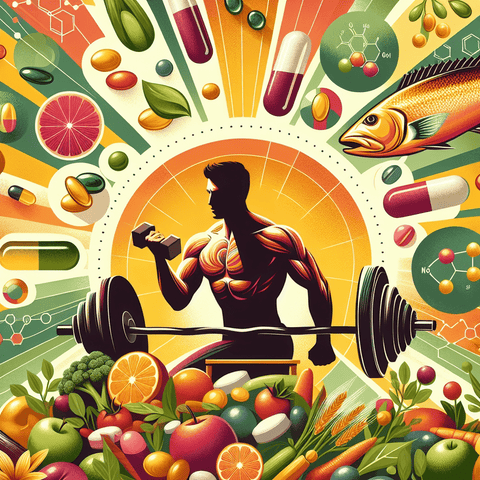Introduction
In today’s health-conscious world, much of the focus lies on weight loss. However, for many individuals—be it due to a fast metabolism, recovery from illness, or undernourishment—gaining weight is just as pressing and challenging a goal. Achieving a healthy body mass is not merely about consuming excess calories; it requires a strategic approach that involves proper nutrition, regular exercise, and supplementation. Especially for those struggling with increasing muscle mass and body fat, understanding the role of key vitamins becomes essential.
Vitamins do more than just support immune health and cellular function—they are central to the metabolic pathways that regulate energy production, appetite stimulation, tissue growth, and muscle repair. This makes them invaluable in any weight gain strategy. When combined with strength training and a calorie-rich, nutrient-dense diet, the right vitamin supplements can accelerate progress, improve recovery times, and optimize the body’s ability to synthesize and store muscle protein and fat tissue.
This comprehensive guide will explore the most effective vitamins for gaining weight quickly and safely. We will examine the biological roles these micronutrients play in the human body, their best sources, how deficiency can hinder progress, and how targeted supplementation can fill in the nutritional gaps. Whether your goal is to build lean muscle mass or simply increase your overall weight in a healthy manner, this article will provide actionable, scientifically sound advice to help you achieve it.
1. Vitamins for Weight Gain: Unlocking the Power of Nutritional Supplements
Vitamins are organic compounds that play an essential role in dozens of biochemical reactions critical for metabolism, tissue growth, and cellular repair. While they don't directly contribute calories, their presence is indispensable in converting the food we eat into usable energy and body tissue. For individuals who find it hard to gain weight, this means ensuring that their micronutrient intake is optimized—not just their macronutrients like carbohydrates, proteins, and fats.
Particular vitamins—often grouped into fat-soluble (A, D, E, K) and water-soluble (B-complex, C)—have been shown to directly or indirectly influence weight gain pathways. Vitamin D improves calcium absorption and influences hormone production, which affects muscle building. B-vitamins, particularly B12, B6, and folate, are vital for converting nutrients into energy and play a critical role in appetite regulation, DNA synthesis, and neurological health. Vitamin C aids with collagen synthesis, which supports muscle tissue cohesion and healing.
In addition to these roles, specific vitamins also work synergistically with metabolic hormones that regulate hunger and satiety, such as leptin, insulin, and ghrelin. A deficiency in these vitamins can lead to low appetite, poor energy levels, and reduced capacity for muscle recovery—hindering weight gain goals.
To gain weight quickly and safely, supplementation should not replace a well-rounded diet; rather, it should enhance it. Frequent resistance training programs increase the body's demands for these nutrients. Consuming vitamin-rich foods and supplements ensures that the body can efficiently process nutrients, repair tissues, and prefer muscle gain over fat accumulation.
It’s also worth noting that vitamin supplements tailored for weight gain are often combined with calories and macronutrients such as protein and healthy fats. These formulations make it easier to meet both micronutrient and calorie goals simultaneously, especially for those with high energy demands or low appetite.
For optimal effectiveness, always consult a healthcare provider before starting high-dose supplements. Also, consider sourcing your supplements from reputable retailers such as TopVitamine’s Vitamin D collection which offers products thoroughly vetted for safety and bioavailability.
2. Muscle Building Vitamins: Essential Nutrients for Supporting Lean Mass Growth
Building lean muscle mass is a cornerstone of healthy weight gain. Muscle tissue is metabolically active and significantly contributes to increased body weight without the negative health consequences associated with excess fat. Certain vitamins are essential in muscle synthesis, energy metabolism, and recovery after exercise. These vitamins support anabolic processes, reduce inflammation, and enhance training efficiency. Let’s delve into individual vitamins that play a pivotal role.
Vitamin D stands out because of its quasi-hormonal nature. Once converted into its active form (calcitriol), Vitamin D binds to receptors in muscle cells and nuclei, influencing gene transcription that governs muscle protein synthesis. Studies in the elderly and in athletes have shown that optimal Vitamin D status enhances muscle strength, reduces injury risk, and improves muscle recovery post-workout. For those embarking on a bulking regimen, this is invaluable. Vitamin D also supports testosterone levels, further boosting its muscle-building potential. You can explore high-quality options in this category from TopVitamine’s Vitamin D collection.
B-complex vitamins, particularly B6, B12, and folate, are fundamental to energy production. Vitamin B6 contributes to protein metabolism; Vitamin B12 plays a key role in red blood cell formation, neurological health, and DNA synthesis; and folate supports cell division and growth. During resistance training, these operations occur more frequently, demanding higher content of these vitamins. Inadequate intake can manifest as fatigue, impaired focus, and poor recovery—slowing muscle gain.
Vitamin C may not be anabolic on its own, but it assists muscle gains indirectly. It’s vital for collagen synthesis, contributing to tendon and ligament strength—important for injury prevention during weight training. It acts as a powerful antioxidant that helps reduce exercise-induced oxidative stress, aiding in faster recovery. Supplementation with Vitamin C from sources like TopVitamine’s curated Vitamin C options can be an effective strategy post-exercise.
Combining these vitamins with a high-protein diet and a consistent resistance training regimen can lead to better results in shorter periods. Always opt for supplements that offer these vitamins in bioavailable forms to ensure maximum absorption and efficacy.
3. Natural Weight Gain Supplements: Vitamins and Nutrients Derived from Whole Foods
While synthetic vitamin supplements have their place, many nutritionists advocate for deriving vitamins and nutrients from whole food sources where possible. Natural supplements and fortified food products offer a synergistic approach to weight gain by not only providing vitamins but also calories, fiber, and other phytonutrients that support overall metabolism, digestion, and hormonal balance.
Fruits and vegetables are rich in micronutrients like Vitamin A, C, and K, along with fiber and natural sugars. Although they are generally low in calories, combining them with calorie-dense foods like nuts, seeds, and healthy oils creates a potent mix for weight gain. Avocados, for example, are high in Vitamins E and B6 and are energy-dense. Bananas are an excellent source of Vitamin B6 and calories. Leafy greens, while light in calories, are nutrient powerhouses supporting enzymatic functions.
Fish oil and omega-3-rich supplements like DHA and EPA have shown anabolic potential. These polyunsaturated fatty acids not only reduce inflammation but also increase muscle protein synthesis when consumed regularly. Moreover, omega-3s play a role in hormone regulation, improving insulin sensitivity, and possibly increasing appetite in underweight individuals. Fish oils are also natural sources of Vitamin D, making them multifunctional. A great collection of these supplements can be found at TopVitamine’s Omega-3 Supplements selection.
Other potent natural sources include fortified eggs, dairy products like full-fat cheeses and milk, and fermented products such as kefir or yogurt, which improve gut health, nutrient absorption, and caloric efficiency. Fortified cereal grains, rich in B-vitamins and iron, can make an easily digestible and calorie-rich snack or meal base.
Herbal extracts like fenugreek have gained popularity due to their ability to increase appetite and enhance testosterone levels—particularly helpful for lean mass gain. These and other adaptogenic herbs offer a natural route to healthy, sustained weight gain without synthetic stimulants or appetite enhancers.
While whole food sources are foundational, their vitamin content can vary with soil quality, farming practices, and processing methods. This makes targeted supplementation a necessary tool for filling any gaps. Ensuring you are combining the two—natural food sources and intelligent supplementation—creates a robust platform for sustainable and rapid weight gain.
4. Essential Nutrients for Weight Increase: Vitamins and Minerals Critical for Body Mass Advancement
Vitamins alone don’t act in isolation. For optimal physiological responses such as appetite stimulation, protein synthesis, and muscle fiber repair, they need to co-function with a range of minerals and trace elements. It's this intricate synergy that makes nutrient timing and supplementation precision vital to achieving fast and sustainable weight gain.
Vitamin A is essential for cellular growth and differentiation. It also plays a role in synthesizing proteins important for muscle growth. While commonly associated with eye health, its anabolic effects cannot be ignored. Sufficient intake supports testosterone production and indirectly boosts muscle gain through hormonal support.
Zinc contributes directly to over 300 enzymatic reactions, many of which influence protein synthesis and immune function. Individuals who lack zinc often demonstrate poor appetite and slow tissue healing. Zinc supplementation has been linked to increased insulin-like growth factor 1 (IGF-1), which enhances muscle hypertrophy and aids recovery from training stress.
Magnesium plays a critical role in energy production (ATP activation), nerve transmission, and muscle contraction. Bodybuilders and athletes often report magnesium depletion after intense training, leading to cramps, fatigue, or underperformance. Replenishing magnesium supports both immediate energy needs and long-term muscle maintenance. You can find top-quality magnesium supplements via TopVitamine’s Magnesium benefits collection.
Minerals like phosphorus and potassium also function in tandem with these vitamins to regulate fluid balance and support muscle function. An upset in this electrolyte balance can impair training intensity and reduce appetite.
Another often-overlooked factor is the effect of micronutrients on hormones like ghrelin, leptin, and cortisol—all of which influence appetite, fat deposition, and muscle breakdown versus synthesis. A comprehensive multivitamin or targeted supplement stack provides not just vitamins but these crucial co-factors, ensuring that your body operates in an anabolic state conducive to weight gain.
Focus on fortified whole foods, legumes, organ meats, and seeds when creating your diet. For additional support, smart supplementation with products containing blended vitamins and minerals is highly recommended.
5. Vitamin Deficiency and Weight Gain: Addressing Nutritional Gaps for Optimal Growth
While consuming enough calories and exercising may seem sufficient for weight gain, underlying vitamin deficiencies can completely derail your efforts. Whether it's a lack of appetite, fatigue, reduced training intensity, or impaired tissue repair, micronutrient gaps can be the missing link in your weight gain strategy.
Vitamin D deficiency is particularly detrimental. Known to affect nearly a billion people globally, inadequate levels of this nutrient can result in poor calcium absorption, leading to weakened bones, muscle pain, and reduced testosterone levels. These effects combine to reduce exercise output and hinder muscle development. If you've been training consistently without gaining weight or strength, you may want to examine your Vitamin D levels. Quality supplementation is available from TopVitamine’s Vitamin D catalog.
B12 deficiency is another common obstacle, especially for vegetarians or older adults. It can cause anemia, fatigue, nerve damage, and muscle weakness—making it nearly impossible to gain muscle or even maintain energy levels. Similarly, deficiencies in folate and B6 reduce protein metabolism and impair cell replication—two essential processes for building new tissue.
Deficits in magnesium, iron, and zinc also impact appetite and reduce metabolic efficiency. These minerals are needed for cellular respiration, so their absence leads to slower energy turnover and sluggish recovery. Over time, this can lead to loss of lean tissue even while consuming sufficient calories.
Signs of deficiency aren’t always clear-cut but may include brittle nails, frequent infections, low mood, fatigue, or muscle cramps. Blood testing, dietary analysis, and symptom tracking can help identify areas of concern. Once deficiencies are identified, correcting them with food and supplements can create a dramatic improvement in your ability to gain weight.
Preventative supplementation and regular nutrient check-ins form the backbone of a healthy mass gain plan. The return on investment is clear: faster muscle gain, better energy, fewer injuries, and greater appetite. Choose supplements that meet high-quality control standards and provide bioavailable forms of essential vitamins and minerals.
6. Best Vitamins for Muscle Mass: Top Nutrients to Accelerate Lean Muscle Development
When aiming to gain weight quickly through increased muscle mass, identifying the top-performing vitamins in this domain can significantly boost progress. Among all, Vitamin D holds the top spot. It does more than support bone health; it aids in muscle cell proliferation, testosterone production, and efficient neuromuscular coordination. An optimal level of Vitamin D is associated with greater fast-twitch muscle fiber development, a crucial factor for strength and hypertrophy gains. A dose of 1000–4000 IU is often recommended, depending on current blood levels and sun exposure.
Close behind is Vitamin B12. It supports red blood cell production, oxygen transport, nerve function, and DNA synthesis—all essential during periods of physical exertion and growth. According to studies, B12 supplementation can improve power output, delay fatigue, and enhance mental focus during training. Dosage ranges between 2.4 mcg to 1000 mcg depending on need and absorption efficiency.
Vitamin C speeds up recovery, reduces yoyo inflammation post-exercise, and fosters connective tissue integrity—key for injury prevention during heavy training cycles. It also boosts iron absorption, which plays an indirect role in muscle oxygenation.
Scientific evidence continues to support the idea that vitamin supplementation not only improves general well-being but specifically enhances the effectiveness of exercise, hormonal response to training stimuli, and muscle protein synthesis.
When trying to gain muscle rapidly, remember it’s not just about stacking calories or protein shakes. It’s about optimizing every variable—nutrition, sleep, training, and supplementation. Consistent intake of these top vitamins, particularly through reputable brands like those found at TopVitamine.com, will significantly support your body’s ability to grow, repair, and perform.
Conclusion
Weight gain, particularly through lean muscle mass, is a sophisticated process that demands more than just eating large quantities of food. Vitamins serve as crucial co-factors that make this process efficient, safe, and sustainable. From Vitamin D’s powerful impact on muscle growth to the metabolic support offered by B-complex vitamins, the role of micronutrients cannot be overstated. They not only increase appetite and energy but also accelerate tissue repair and enhance the hormonal environment needed for muscle growth.
For those struggling with underweight conditions, fast metabolism, or post-illness recovery, incorporating targeted vitamin supplements can make a significant difference in achieving healthy weight gain goals. Leveraging both natural sources and high-quality supplements from trusted providers like TopVitamine.com ensures that the nutritional needs of your transformation journey are covered.
Always consult with a healthcare professional before beginning any new supplement regimen. Take the time to identify deficiencies, customize your approach, and combine supplementation with a balanced diet and strategic weight training for the best outcomes.
Q&A Section
Q: What is the most effective vitamin for gaining weight quickly?
A: Vitamin D is widely considered the most effective for aiding rapid weight gain, particularly by promoting muscle strength, recovery, and hormonal balance.
Q: Can B-vitamins help with weight gain?
A: Yes, B-vitamins, especially B12, B6, and folate, enhance metabolism, promote energy, and support protein synthesis—all crucial for weight and muscle gain.
Q: Are natural or synthetic vitamins better for gaining weight?
A: Natural vitamins from whole foods and supplements like fish oil tend to be more bioavailable and come with additional nutrients. However, synthetic supplements are useful when specific deficiencies are identified and need targeted correction.
Q: What minerals are important alongside vitamins?
A: Magnesium, zinc, and iron are especially important as they support muscle function, oxygen transport, and enzyme activity crucial for growth.
Q: How do I know if I’m deficient in a vitamin?
A: Common signs include fatigue, muscle weakness, lack of appetite, poor focus, and slow recovery. Blood tests and dietary reviews can confirm deficiency.
Important Keywords
- Weight gain vitamins
- Vitamin D for muscle growth
- Best vitamins for weight increase
- Natural supplements for weight gain
- B12 for lean mass
- Appetite boosting vitamins
- Muscle building nutrients
- Magnesium for energy and muscle
- Fish oil weight gain
- Vitamin deficiency and weight loss



